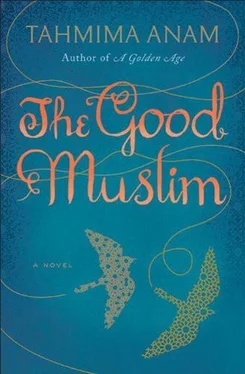After the Milaad the women passed around dishes of food and Ammoo began playing the hostess, encouraging everyone to eat. Someone offered Maya a plate but she refused, her tongue heavy in her mouth. She was suddenly overcome with weariness, and she considered slipping into Sohail’s old room and putting her head down for a few minutes. No one would notice. She closed her eyes. She heard people shuffle around her. Her head kept slipping sideways and when she opened her eyes the room was empty.
She found Ammoo in the kitchen.
‘Ma?’
‘Oh, you’re up. I didn’t want to wake you.’
Her lids were heavy. She took a few steps, faltered. Ammoo led her to the sofa. She wanted to talk to Ammoo, tell her about Nazia and the mud they threw at her window. And the lashes. She wanted to tell her about the lashes. But it was one thing for Ammoo to smile at her, to greet her tenderly, and another for the years to fall behind them. She collapsed on the sofa, struggling to keep her eyes open. ‘I have to tell you something.’
‘How did you come?’
‘The train, the ferry, the train.’
‘You must be tired. Lie down for a bit.’
She felt herself nodding off again. ‘I brought you a tree.’
‘I’ll wake you up; it’s only three now.’
She pulled her eyes open. There was a brown box against the wall. She hadn’t seen it before — the upstairs women had covered it with a tablecloth. ‘When did you get that?’ she asked, stumbling to her feet and examining it.
Ammoo’s face brightened. ‘A little gift to myself.’
‘Seriously?’
‘I saved and saved. Took me two years of leftover rent. There’s a German man living in the big house now, always pays the rent on time. You haven’t seen Magnum, P.I. ?’
‘There’s no television in Rajshahi.’
Ammoo’s eyes widened in mock horror. ‘That’s very sad.’
They laughed. Ammoo sounded so cheerful she almost erased the loneliness of it, waiting with a plate on her lap for the BTV news at eight.
Maya lay her head on the cool pillow. Just for a moment, she thought, then I’ll give Ammoo the mango tree and explain everything. She slept. Through the shutters she glimpsed the tiger stripes of sunset, and later Ammoo came in to cover her with a blanket. She heard the muezzin marking the end of the day. A whisper in her ear: did she want something to eat? She curled her hand around her mother’s knee. No. Later, a cat slipped into the room and lay across her feet. She felt the quick heartbeat, the warmth radiating out of the little body.
She dreamed of Rajshahi.
In her dream it is the pineapple field that marks the end of everything. There is one day when she is as fierce and impenetrable as winter fog, walking around the village with the stetho wrapped proudly around her neck. No chains of gold; she is a doctor. Early that morning she saved a mother and a pair of twin boys, performing the emergency C-section herself, the cutting and stitching in perfect rhythm, her hands sinking deep into the shared womb. And, although she reminded the family they should have loved the babies just as well had they been girls, she enjoyed the tight embraces of the women, the relief; she munched on the triangle of wrapped betel leaf they offered her. Now she is striding through the village and on to the dirt path that leads to the road that leads into town. Her arms are swinging, January wind pinching at her face, and she is passing the pond, where she waves to the boy who lost a brother to snakebite last year (too late, that day), and she ducks under a pair of mango trees and decides to take a shortcut through the pineapple patch. A few steps in, and the sun is high, the field looks wider now than she had thought, but she is not the sort of person to turn around, so she lifts her sari above her ankles and treads delicately, avoiding the sharp thorns of the pineapple plants. She is tempted to peel back the leaves and check for a ripe joldugi, but she knows it is not the season. Still, the air is sweet and bee-heavy, and when she has reached the end of the field she lowers the hem of her sari and continues, humming a nursery rhyme she was taught by little Maya the night before. And then she sees the meeting. A dozen men in a circle. Masud stands in the middle. ‘It’s the doctor,’ he says; ‘she’s the cause of all the trouble.’
Maya woke up to darkness. She was dressed in one of Ammoo’s salwaar-kameezes, worn through at the elbows and smelling strongly of soap. By habit, she fingered the scab on her neck. A hard pellet, it refused to budge as she picked at its edges. She wrapped the blanket around her shoulders and went to find her mother. Ammoo was in bed, running a plastic comb through her hair.
‘I thought you might sleep all night.’
Maya ducked under the mosquito net and climbed in beside her. ‘I didn’t realise how tired I was.’
Rehana parted her hair down the middle, creating a perfectly straight seam, and began to braid one side. The ritual brought Maya back to all those mornings before school, getting up ten minutes before Sohail so that her hair could be oiled, plaited and ribboned. She thought of her brother now, holding her hand as they walked through the school gates.
‘Tell me about Sohail.’ In all the letters they had exchanged, Ammoo had said so little about him — only that he had moved upstairs, that his wife had delivered a son, that she saw hardly anything of them, so busy were they with their religion.
Ammoo picked up the comb again and began to tell her. They called themselves Tablighi Jamaat. The Congregation of Islam . Silvi had held meetings upstairs, preaching to the women about everything there was to know about being a Muslim. God, men, morality. Purdah and sex. The life of the Prophet. His wives, Ayesha and Khadija and Zaynab. The raising of children. How to be one of the faithful. And Sohail had his own group of followers at the mosque; many men had been led to the way of deen — the way of submission — under his direction. They brought their friends, their errant sons, and Sohail told them what to believe and how to live. He was considered a holy man.
‘They have twenty, thirty people living there. And almost a hundred during the day. I lost count.’ They had moved upstairs soon after Maya left. Started out with the brick room in front, then added the outside staircase so they could come and go without disturbing her. Then the tin rooms, the toilet, the kitchen.
‘How did she die?’
‘She had jaundice. They didn’t notice until it was too late.’
She thought of Silvi’s skin turning yellow, her eyes the colour of yolks. ‘And Bhaiya?’
‘For him, it is the afterlife that matters.’
‘Things will change now’, Maya said, ‘without Silvi.’
‘Maybe,’ Ammoo replied, sounding uncertain. ‘Come, let me comb your hair.’
Maya moved closer to her mother, but instead of sitting in front of her she put her head down on Ammoo’s lap. Ammoo smoothed her hand across her forehead. ‘I can hardly believe it,’ she said.
Maya’s eyes began to burn. The words rose up in her throat. Ammoo was running her fingers through her hair now, gently massaging her scalp.
‘What’s this?’ She peered down, brushing the hair from Maya’s neck.
‘It’s nothing, just a cut.’
‘On your throat?’
‘It’s a long story, Ammoo.’ She sat up, pulled the hair around her neck.
‘Tell me.’
The punishment was one hundred and one lashes. Masud came back from the meeting and spat the words at his wife. ‘One hundred and one,’ he said. ‘That’s what you deserve.’
Maya stood between Nazia and her husband. ‘For what?’
‘For lying about the child. He’s not mine.’
It’s not a curse, she had told them, it’s Down’s syndrome. The child will be different, he’ll have problems, but he’ll survive, I can show you how to care for him.
Читать дальше












